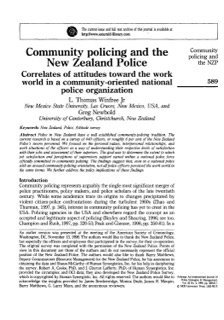By: L. Thomas Winfree Jr and Greg Newbold
Police in New Zealand have a well-established community-policing tradition. The current research is based on a survey of 440 officers, or roughly 6 percent of the New Zealand Police's sworn personnel We focused on the personal values, interpersonal relationships, and work situations of the officers as a way of understanding their respective levels of satisfaction with their jobs and assessment of their superiors. The goal was to determine the extent to which job satisfaction and perceptions of supervisory support varied within a national police force officially committed to community policing. The findings suggest that, even in a national police with an avowed community-policing orientation, not all police officers perceived the work world in the same terms. We further address the policy implications of these findings.
22 Policing Int. J. Police Strat. & Mgmt. 589 1999



